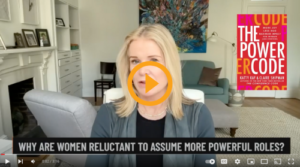What is it about power that’s so alluring? Is it the potential to change the world? The ability to influence others and make a difference? Or is the concept of power in and of itself inherently flawed? In her new book Power Code, Katty Kay challenges traditional notions of power and leadership to explore the complex relationship between women and power. With the help of Claire Shipman, she uncovers a deeper issue: that the existing power structures are inherently flawed, and it’s not just women who need to change to achieve true equality. This book is a compelling exploration of the complexities of the power dynamic and an inspiring call to action for both women and men looking to make a difference.
Read on for important lessons in power from Katty Kay’s new book.
IT’S ABOUT TIME – THE TOPIC OF WOMEN AND POWER
In their groundbreaking new book, The Power Code – More Joy. Less Ego. Maximum Impact for Women (and Everyone), Katty Kay and Claire Shipman explore the complex relationship between women and power. Challenging the prevailing narrative that women lack the necessary qualifications or ambition for leadership roles, Katty and Claire uncover a deeper issue: the inherent flaws in existing power structures. According to Katty, it is not women who need to change but rather the concept of power itself.
For Women, It’s the WHY of Power That Matters:
SURPRISING FINDINGS IN THE POWER CODE
Surprising findings emerged during the research for The Power Code, which was inspired by conversations Katty and Claire had with women after publishing their previous work, The Confidence Code.
It became evident that women, regardless of how power is defined, were hesitant to pursue it due to the high costs and compromises associated with reaching positions of authority. And many women felt their observations of power in action often revealed unappealing aspects such as egotism and mansplaining.
What the authors were seeing was a lack of motivation that can be attributed to the historical dominance of male-centric power structures that fail to resonate with women.
WOMEN ARE TUNING OUT WHEN THEY’RE NEEDED MOST
The reluctance of women to pursue power, in the traditional sense, presents a real challenge for organizations in need of hiring great talent. Research consistently demonstrates that organizations thrive when women hold positions of power. Numerous international studies, including one conducted by the International Monetary Fund, have confirmed the positive impact of female leadership on an organization’s profitability and overall performance.
What’s left is a chicken and egg situation where Katty and Claire cited the need for more women in roles of higher leadership and the dearth of women keen to assume those roles.
CHANGING HOW WE ENVISION POWER
The authors concluded, after extensive analysis and reflection, that solving this conundrum wasn’t about changing women’s attitudes about power – but more about redefining power itself.
Women already demonstrate power in various aspects of their lives, excelling at multitasking and achieving success both personally and professionally. The key lies in reconceptualizing power—its definition, application, acquisition, and accessibility. By doing so, not only will women benefit, but power structures as a whole will become more effective.
Organizations with More Women Perform Better:
MORE JOY. LESS EGO. MAXIMUM IMPACT FOR WOMEN (AND EVERYONE)
The subtitle of the book, The Power Code: More Joy. Less Ego. Maximum Impact for Women (and Everyone), encapsulates its core message. The authors emphasize that power can bring joy and fulfillment, and women need to recognize the potential positive outcomes associated with wielding power. By shifting the focus away from ego aspects of power, individuals can concentrate on achieving meaningful goals that benefit their communities and organizations. The emphasis is on generating results that are beneficial to everyone involved.
WOMEN LEAD DIFFERENTLY
How women approach leadership is largely different than their male counterparts and plays a significant role in the success of organizations. Studies consistently indicate that women excel in collaboration, taking a long-term view, and maintaining stability. This is evident in various fields, including wealth management, political leadership, and crisis management. Women excel at skills such as active listening, negotiation, mentoring, and consensus-building which prove to be invaluable in navigating crises, politics, and business.
Talking with Men About Power Code:
PARENTING INVOLVES SEVERAL IMPORTANT WORK SKILLS
The Power Code also explores how some forward-thinking leaders are reevaluating the assessment of women’s skills. Christine Lagarde, the former head of the International Monetary Fund and current head of the European Central Bank, recognized the value of skills acquired during child-rearing. Lagarde advocated for acknowledging the experiences and abilities gained during parenting as leadership skills, which should be valued in professional settings. This shift in perspective opens up creative ways of thinking about power and offers opportunities for individuals who may have struggled to access or embrace it.
PIONEERING WOMEN TALK ABOUT POWER
Some Women Who Embraced Power:
Throughout the book, Katty and Claire interviewed a range of influential women to gain insights into their experiences with power.
One, a national assemblywoman from Senegal, was someone Katty met on a family trip. She told Katty she viewed power as a tool to improve lives. She recounted how women in the National Assembly prioritized initiatives such as providing lighting in maternity clinics and establishing separate toilets in schools to ensure girls did not miss out on education. These women’s perspectives diverged from the traditional focus on infrastructure and revealed alternative approaches to addressing societal challenges.
Another, Zanny Minton Beddoes, the first female editor-in-chief of The Economist, offers different perspective on power. She prefers to use the term “leadership” and finds satisfaction in the overall success of the organization. Minton Beddoes believes in giving credit to others and emphasizes that power should not revolve around an individual’s ego but rather the collective achievement.
TAKE THE POWER CODE QUIZ
To engage readers in further reflection on power, Katty and Claire have included a survey in The Power Code to gather diverse perspectives. By encouraging individuals to participate, they aim to foster a broader dialogue about power and its impact.



